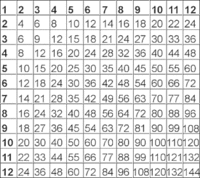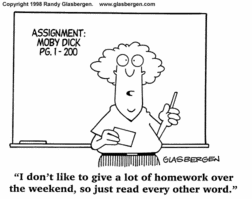Multiplication and Division Tools
The grade level that I teach, sixth, expects that students already have their multiplication and division facts mastered. Often this is NOT the case though.

For multiplication, I still continue to work on the basic facts periodically through the year. I give timed tests about twice a marking period, and the students graph the results. Multiplication charts are not allowed by me, unless there are special circumstances. I give them 1 minute tests and there are 50 problems on the sheets. The goal for sixth grade, for my room, is 30 or more in a minute. Everyone last year made it by the end of the year.
I also like playing a few games to enhance multiplication. One is around the world. I use flash cards for this. The goal is for a student to make it all the way around the classroom. To advance to the next person, the winning student must say the product of the card I hold up FIRST. That student keeps going until someone says the correct answer quicker. Sometimes you get students who are really fast and they win all the time. In that case, I let them take my job, and that gives another student a chance to win.
Another good multiplication game is flash card capture. This is best with 3-6 students. It can also be played with just students. A flash card is shown. The first person to say the correct answer gets the card. The person with the most cards captured is the winner.
This game can also be played with the division flash cards. The students really like it, and I've had some practice a lot so they can win this game.
Division is a whole different matter for some students. Some don't see the connection with multiplication, even if you show them 100 times. I personally can finish a timed test with the basic division facts much quicker than multiplication, but then again, that's my specialty area. There are only 10 answers though, so it should be quicker.
I do use a couple of ideas that seem to help. One is the Division Family:
Division Family
Daddy- Divide
Mommy- Multiply
Sister- Subtract
Brother- Bring Down
Rover- Remainder
Another thing that I use for division is a division rap:
A Division Rap!
I’m Mr. J and I’m here to say
A division rap, and it goes this way
Divide, Multiply, Subtract, and bring down
I said Divide, Multiply, Subtract and bring down.
I’m Mr. J and I’m on the scene
With a division rap that’s truly mean
Divide, Multiply, Subtract and bring down
I said Divide, Multiply, Subtract and bring down
Now you can do it wrong, or you can do it right
But if you do it WRONG, you could be here all night
SO Divide, Multiply, Subtract and bring down
I said Divide, Multiply, Subtract and bring down.
There are many other methods that work for helping students learn these facts. Sometimes it takes manipulatives, or things they can touch and see. Hands-on learning is one of the best tools for these students. Others just need to see examples. Some need music, like the division rap to get it stuck in their head.














